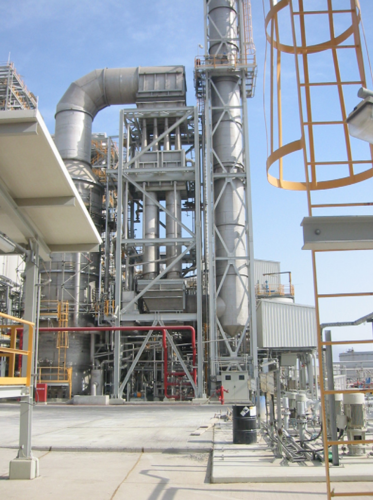Dupont Clean Technologies provides wet scrubber unit for Gazpromneft Omsk refinery

The Gazpromneft Omsk Oil Refinery (Omsk) in Siberia, Russia has significantly lowered its air emissions using BELCO® wet scrubbing technology licensed by DuPont Clean Technologies (DuPont). With an installed capacity of 22.23 MM tons of oil per year, the Omsk Oil Refinery is one of Russia’s leading oil refineries. The BELCO® wet scrubbing technology was installed at Omsk during a fluidized catalytic cracking unit (FCCU) revamp and efficiently removes process impurities from the flue gas emitted by the FCCU thus reducing air emissions well below detection limits.
The introduction of the BELCO® wet scrubbing technology was an important part of a large-scale modernization project that Gazpromneft began at the Omsk refinery in 2008. One of the aims of the project was to systematically introduce technologies that reduce the refinery’s environmental impact. This included treating the FCCU flue gases with the BELCO® scrubber to intensely clean them of atmospheric pollution. The BELCO® technology design allowed the Omsk Oil Refinery also to solve a challenging installation and plot space problem for the gas cleaning section. Thanks to the unique scrubber design, which is contained in a single upflow tower, the refinery was able to simply dismantle a pre-existing 70m tall, brick flue stack and install the scrubber on the previous chimney foundations. This was key for the site as the plot space for the unit at the refinery is very tight.
The BELCO® scrubber uses a unique, proprietary design consisting of a water spray tower equipped with a filtering module and droplet separators. Larger particulate and SO2 are removed in the spray tower, and fine particulate is removed in the filtering module section, so that only cleaned flue gas leaves the tower. The process is fully automated, and the new custom-designed scrubber system comes with built-in control analyzers that allow for constant online monitoring.
“For many of our customers, environmental stewardship is a priority,” said Yves Herssens, EMEA Business Development manager. “They want to limit emissions but need efficient systems that enable them to achieve their goal reliably, consistently and quickly. The BELCO® wet scrubber is an extremely robust technology that will allow the Omsk Oil Refinery to achieve its goal of reducing air emissions in line with Russia’s “Project Ecology” with minimum maintenance over the next few decades. It is part of the emissions control solutions that we offer the refining industry which also include DynaWave® wet scrubbing technology, STRATCO® alkylation technology and IsoTherming® hydroprocessing technology.”
“For the Omsk Oil Refinery, ecology is an absolute priority. The company systematically introduces technologies that reduce the impact on the environment. The Omsk Refinery was one of the first refineries in Russia to use this state-of-the-art fluid catalytic cracking regenerator flue gas cleaning technology. This is an exclusively environmental protection project that supports our high standards of environmental safety,” said Oleg Belyavsky, General Director of the Omsk Refinery.
BELCO® wet scrubbing technology is the global standard for limiting flue gas emissions from FCCUs, fluid cokers, fired heaters and boilers. The BELCO® wet scrubbing system reliably controls particulate, SOx and NOx emissions in a single upflow tower, thereby eliminating the need for a separate control device to manage different emissions. With its unique open-vessel design and non-plugging features, the BELCO® wet scrubbing system is extremely robust and proven to support uninterrupted FCCU operation, with units typically working continuously for 3-7 years without any maintenance or service shutdowns. The BELCO® wet scrubbing system is engineered to handle severe upset conditions including high-particulate carry over and high-temperature excursions.






Comments